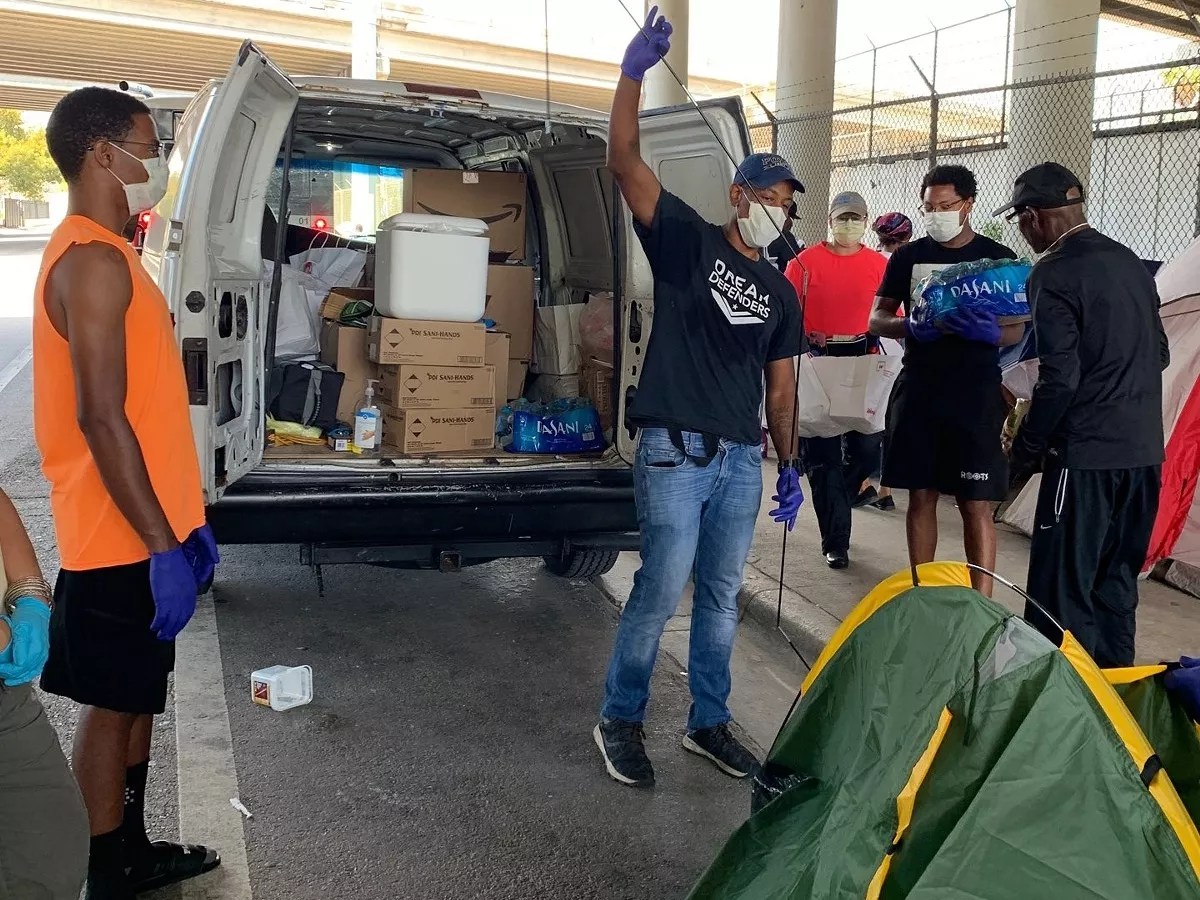
Photo courtesy of Dream Defenders

Audio By Carbonatix
Armen Henderson, a University of Miami doctor, made national headlines last week when he released a video of a Miami police officer handcuffing him after a brief interaction outside his Flagami home. Henderson, who is black, has since spoken out against racial profiling and injustice in the city.
As an advocate for the homeless, he has mounted that same fight against injustice on behalf of the people living on the streets of Miami. In recent weeks, as the novel coronavirus has spread across South Florida, the doctor has provided free COVID-19 testing for the homeless. And today at noon, Henderson, along with the Dream Defenders and other nonprofits, will host a press conference downtown to talk about the risk of coronavirus in Miami’s homeless population and to criticize the county’s Homeless Trust for what they believe is a history of inaction.
“What kind of show are they running? They’re telling people they’re helping the homeless, but they’re not really doing anything,” says Henderson, who is the Dream Defenders’ director of health programs.
The need to test the homeless is of huge importance in Miami, where about 1,000 people are living on the streets and almost 3,000 are in shelters. Public health officials have said coronavirus presents a serious risk for homeless people, who cannot easily shelter in place and don’t always have personal hygiene products or medicine available. Homeless shelters can also be breeding grounds for outbreaks if not properly monitored, as demonstrated by an outbreak in San Francisco.
Nevertheless, Henderson says the Homeless Trust — the largest and most powerful homeless aid organization in Miami-Dade County — has been less than cooperative when it comes to partnering with him to administer tests. The doctor says the trust did not allow him to use its facilities to perform COVID-19 tests on homeless individuals and at one point even questioned his credentials.
“They called the Department of Health on me to see if I was even a doctor,” Henderson says.
Ron Book, chairman of the Homeless Trust, defends his organization’s response to the crisis. In a phone call with New Times, Book says he did not want to use the quick testing kits he heard Henderson was using because he was advised they were inaccurate.
“If I could test everybody quickly, does anyone think I wouldn’t do that? Only a fool would think that,” says Book, adding that he and his people have gone out and tested with the deep nasal swab kits, which he says are more effective. (Henderson, for his part, says he’s been using the same nasal swab kits as Book, although he says he would also use the quick tests if they became available.)
At today’s press conference downtown, the advocates will pass out tents and other supplies for those who choose not to go to shelters. Dream Defenders will also announce an expanded effort to place bathrooms and showers for the homeless downtown and in Overtown. The group says it will put up showers and toilet stalls in the parking lot of St. John Institutional Missionary Baptist Church, located at 1328 NW Third Ave. Organizers plan to install nearly 60 toilets at an undisclosed location downtown, according to a press release.
Setting up public bathrooms and showers is something the Homeless Trust has historically been opposed to. Book has rebuffed the need for public restrooms in the past, saying it was his job to get homeless off the streets, not to make it easier for them to stay out.
Barring action from the Homeless Trust, the City of Miami and the Downtown Development Authority (DDA) in recent years installed a handful of public restrooms for use by the homeless or anyone else who might need a bathroom break. But when the coronavirus crisis hit Miami-Dade last month, those public restrooms were closed. Although the city set up porta-potties for the homeless at South Miami Avenue and SW Second Street, the toilets haven’t been enough to keep up with the need, advocates say.
“There are two porta-potties for 200 people living downtown. One porta-potty is supposed to be for five people for a week,” Henderson says. “The porta-potty was full to the brim a week and a half ago.”
When New Times informed him about the overflowing porta-potty, Miami Commissioner and DDA Chairman Manolo Reyes was not pleased.
“That is unacceptable,” Reyes said in a phone call yesterday.
An hour later, Department of Human Services Director Milton Vickers called to say the city was now negotiating with the vendor to move the toilet to another location.
“The vendor services the potties at 4 a.m. each morning. By 5 or 6 a.m., they are full again or someone is sleeping in them,” Vickers said. “Some individuals have gotten a little aggressive with employees, who are hesitant to come back.”
Reyes says the DDA plans to add four new public restrooms downtown that the homeless can use and hopes to add more in the future. Construction for the initial four was delayed by the COVID-19 lockdown, he says.